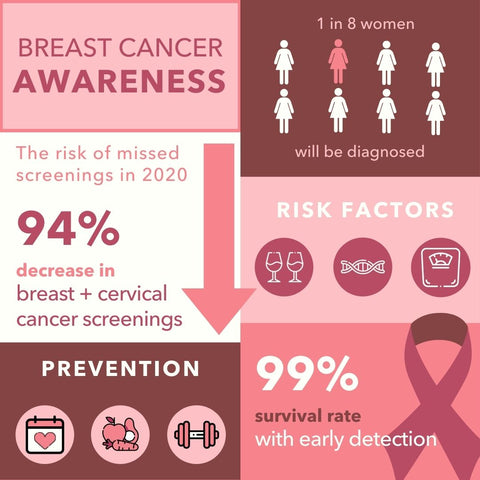Breast Cancer Awareness: The Risk of Missed Health Screenings
Did you know that 1 in 8 women will be diagnosed with breast cancer in her lifetime? Breast cancer is the most common cancer diagnosed among US women and the second leading cause of death among women. October is Breast Cancer Awareness Month, an annual campaign to increase awareness of the disease and make sure every woman has access to education, screening, treatment, support, and hope. While you can’t always prevent cancer, it is important to be proactive about your health and assess your risk.

It is estimated that in 2021, approximately 30% of all new women cancer diagnoses will be breast cancer. This may be partially attributed to the 96.6% decrease in breast cancer screenings in April 2020 due to the COVID-19 pandemic. Although screening volume started to recover by June 2020, the declines observed early in the pandemic may result in delayed diagnosis, potentially contributing to worse outcomes and exacerbated health disparities.
So, how can you protect yourself? The first step is making a commitment to speak with your healthcare provider about routine screenings. While the exact cause of breast cancer is unknown, screening and early detection are extremely important.

Breast Cancer Screening
According to the American Cancer Society, when breast cancer is detected early, and is in the localized stage, the 5-year relative survival rate is 99%. Many breast cancer symptoms are invisible and not noticeable without a professional screening, but some symptoms can be caught early just by being proactive about your breast health. Talk to your doctor about these common screening tests, decide which are right for you, and when you should have them.
- Mammogram
- Breast Magnetic Resonance Imaging (MRI)
- Clinical breast exam by doctor or nurse
- Breast self-examination
Know Your Risk
Many women who develop breast cancer do not have any known risk factors. However, women who possess certain risk factors are at a higher risk of developing breast cancer than the general population. Some risk factors are unavoidable, while others can easily be modified.
Fixed Risk Factors
- Women over the age of 55
- Inherited changes in your BRCA1 and BRCA2 genes
- Starting menopause after age 55
- Personal history of breast cancer
- Family history of breast and ovarian cancer
- Previous treatment using radiation therapy
- Diet: some studies have suggested that diets high in fruits and vegetables and calcium-rich foods, but low in red and processed meats might lower the risk of breast cancer.
- Physical inactivity: regular physical activity reduces breast cancer risk, especially in women past menopause.
- Being overweight or obese after menopause: the risk of breast cancer after menopause is higher for women who gained weight as an adult, but the risk before menopause is actually lower in women who are obese.
- Alcohol consumption: women who have two to three drinks a day have about a 20% higher risk than non-drinkers.
Nutrition for Longevity is more than a supplier of custom meal plans. We truly believe in curating food that is medicine. We follow the Pillars of Longevity that help achieve balance in life backed by three decades of science and research. We encourage daily physical activity along with other healthy habits to help build a lifestyle that reduces the risk factors that can lead to chronic disease.
The last two years have been a powerful reminder that we are all in this together, and our choices and actions have the power to protect the most vulnerable among us in a big way. The same holds true when it comes to breast cancer. There are over 3.8 million breast cancer survivors in the United States. With early detection, modifying certain risk factors, and committing to yearly screenings we can help increase that number.


